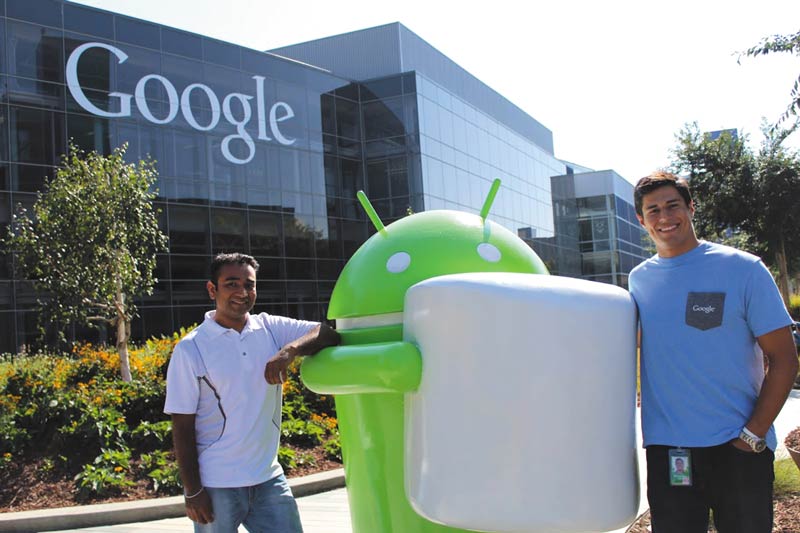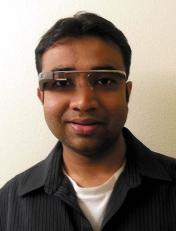Going Google
Fall
2015
Pathways - Advice from Experienced Voices
Going Google
Why I decided to quit graduate school and move to industry
By:Sandeep Giri, Manager, Advanced Technology Manufacturing (Project Loon) at Google X in Mountain View, CA

When I was a teenager, I moved from India to a small college town in Iowa. I wanted to study computer science. I ended up in physics (and joined SPS) thanks to a very convincing undergraduate advisor.
First he suggested I take a physics class, which turned out to be easy for me. Then he invited me to his lab to melt some glass.
The next thing I knew I was deep into glass research with him. He sent me to Fermilab and Oak Ridge. I presented at conferences, and we published half a dozen papers together. I went on to start a PhD program at Stanford, where I worked on chemical vapor deposition tools.
I was working on a research project that was going well when I decided to quit academic research. In retrospect, it was one of the best decisions I ever made.
 Today, 10 years later, I work at Google X, a "moonshot" wing of the company responsible for many of its major technological advancements. I lead a multidisciplinary team of manufacturing engineers working on Project Loon, an effort to use stratospheric balloons to provide Internet access to places where ground infrastructure is difficult to build (see Ben Perez’s story on page 16).
Today, 10 years later, I work at Google X, a "moonshot" wing of the company responsible for many of its major technological advancements. I lead a multidisciplinary team of manufacturing engineers working on Project Loon, an effort to use stratospheric balloons to provide Internet access to places where ground infrastructure is difficult to build (see Ben Perez’s story on page 16).
Knowing when to quit is difficult, but quitting is actually not a bad thing. Let me explain.
As a graduate student, I felt like I wasn’t learning and growing at the rate I wanted. I walked into my PhD program with the impression that it was going to shape me, that I would have a wide variety of experiences and build incredible projects.
Instead it felt like a very sheltered environment. I went from my apartment to my department every day. I published papers. I went to conferences and talked to like-minded people. That was my graduate school experience.
Then I had dinner with a friend who had been working in industry for a long time. He started talking about all the things he had done at Apple. He used terminology I had never heard before. He had just come back from a business trip to China, where he had been part of setting up a manufacturing process for iPods. He had been working with different companies in Japan and Taiwan. He had learned about reliability and quality testing, and talked about the organizational structure of his company.
I had just spent a day in the lab trying to deposit the same crystals I had been trying to deposit for three months. My experience felt very bland and narrow compared to his.
I wanted to emulate him.
It’s kind of ironic, but I made the decision to quit the day after I passed my qualifying exams at Stanford. I told my advisor I was leaving in three months. She didn’t want me to. I was in the thick of things. I had built new tools. It would take awhile to bring in someone new and bring them up to speed. She tried to persuade me to stay.
There was a little bit of guilt. I felt like I was betraying my project and my professor, who had invested time and resources in me. I was also leaving a school with a department that was number one in the country.
I was leaving a lot at the table, but I stuck to my guns. In the end, it was the right choice for me.
I still do research in industry, but I study different things at a faster pace and with more more resources. At my first post-Stanford job, at Qualcomm, I jumped into product development. I worked on solar technologies and MEMS-based screens for mp3 players, smartphones, e-readers, and smart watches. In 2011 I packed my bags, took my family, and became an expat, setting up manufacturing facilities in Taiwan.
When I came back to Silicon Valley, people were looking for folks with that hands-on experience. I took a position at Google X and helped to bring up manufacturing processes for Google Glass in Singapore, Switzerland, and the United States. I developed optical technologies for the next generation of Glass before moving over to Project Loon.
My advice to undergraduates is to explore your options. Start by doing some research in a university lab or a national lab to get a feel for academic research. Do some research in an industrial setting too. Talk to people who took the PhD path, people who became postdocs and professors, and PhD researchers in industry. Talk to people who started working right after their undergraduate degree, or after a master’s degree. Talk to people who did what I did, who quit and went to industry. Try to get a wide spectrum of perspectives from people on different career paths.
Have honest conversations with yourself. What motivates you? How much do you like working with equipment every day? Do you like the pace and culture of the academic environment? How would you respond to a faster-paced, more application-oriented environment? What kind of environment do you want to spend the majority of your twenties in?
I consider the twenties to be one of the most critical periods of our lives. We make several important decisions during that time, career direction being one of them. By the time most people finish their PhD, they’ve been in a university for a decade (including their undergraduate experience). That experience is rewarding for many people, and it can lead to groundbreaking discoveries and advancements, but it’s not for everyone.
If I could go back to my time as an undergraduate, I would look outside the walls of my university. I would volunteer at Rockwell Collins, which had a facility right next to my alma mater. I would go work for free. There are all these nuances about working in industry that aren’t usually taught in the classroom. What’s the pace like? How do you write professional emails? How do you prepare presentations for the business environment? How are meetings conducted? How does a company partner with external companies?
Go get your foot in the door. //
Learn More
For more information on Google's balloon-powered Internet, see www.google.com/loon/.




